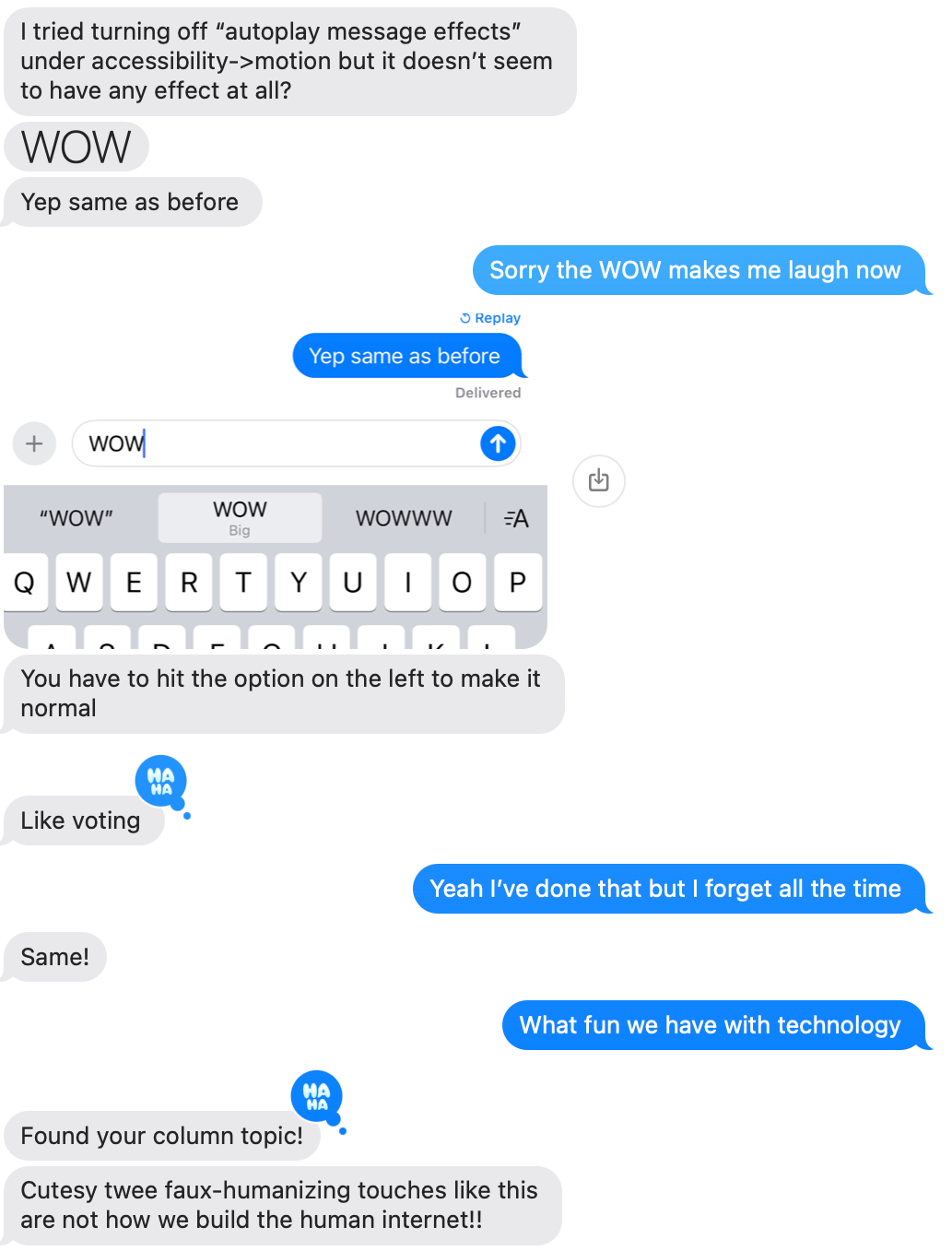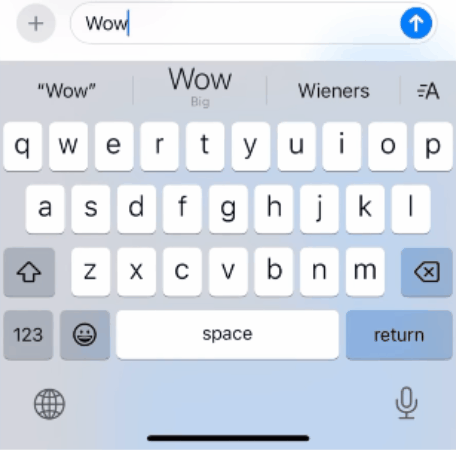Log In, Always On, Opt Out

If you have an iPhone and are using iOS 18 or higher, you have likely encountered something extremely annoying: Message effects. Specifically, the text animation.
If you don't know what I'm talking about, or if you're not sure you've seen it, here's a gif I spent far too long making. When you type a word like "wow" or "big," Messages gives you a new animated option in the predictive text choices just above the keyboard. "What's so bad about that?" you might be wondering. Sure. If it were only a predictive text choice, I'd concede the point.

But no. If you don't remember to choose the non-animated text option before you hit send, Messages automatically animates the text for you. So every time I send the word "wow" or "big," instead I send "WOW" or "BIG."
Now you're wondering, "Just go into settings and turn this off, you weirdo." Ah, but you see, I can't. Not unless I also want to turn off autocorrect, and I don't want to do that. Autocorrect has thus far been a pretty useful feature, at least when it works well, which admittedly it sometimes does not. It has what I consider to be a very specific use case: It corrects the text you have typed using your large thumbs on a small keyboard. It does not, in my mental model, have the use case of also correcting your unanimated text and making it ripple or shake, because in what fucking world would that be the default option.
Yesterday, my friend Brian tried turning off "autoplay message effects," but as you see in the screenshot at the very top of this newsletter, that didn't work. Then earlier today, I thought I had successfully eradicated this feature by turning off the predictive text feature, which I can more easily text without (at least when I text in English, since it does come in handy in languages I have less facility with in writing). Unfortunately that did not entirely do the trick either. If you type "Wow" it might not animate, but if you type "WOW" it will. And look, sometimes a girl just wants to text WOW, ok?
When I was working at Mozilla last year on a contract, I had some interesting conversations with both colleagues and users about technology that requires you to opt out rather than to opt in. This may or may not be something you've spent a lot of time thinking about, but long-time dedicated Firefox users had very strong opinions on the subject. Honestly, even if you haven't spent a lot of time thinking about it, I bet you still have strong opinions on the subject, maybe without realizing it.
These conversations were in large part about user autonomy, particularly when it came to consent and privacy, and of course about what's in a company's best interest vs. what's in an end user's best interest. After all, it's much easier to introduce people to a new feature if you opt them in but provide an option for them to opt out, right? You might not even know the feature exists once it's launched, let alone know you want to try it out, let alone think to opt in and use it. But if you're opted in and are the kind of user who doesn't think much about whether a company should automatically opt you in to a new feature or product, you might start to use it without even realizing.
This is especially true for data you need to collect that would require a complicated conversation about why you need it and what you intend to do with it. Think about it this way: How often do you check a box to opt in to something? If I told you, "Hey, I want to collect a bunch of information about you and share it with a third party over whom neither of us have any control," would you say yes? Probably not. But how often do you spend the time to figure out if companies are doing this without your consent and, if so, how you can opt out of it? Plenty of us get fed up from time to time and hit that "accept all cookies" button, even when we know we shouldn't.
I would say that most people have learned all of this the hard way, thanks in large part to social media. But even after we learned it, did that fundamentally change our behavior? Who among us reads the terms of service every single time? Who among us immediately changes all the privacy settings and customizes all the features, plug-ins, options, whatever? Ok, fine, some of you do. I'm willing to bet the majority don't, even if you think you do.
But here's the thing I never stopped to consider before last year: Most of us had a choice. Our data was not "already out there." We existed in a time before everything was digital. Ours was not an "always on" world. For many adults, there was a divide between the online world and the offline, or so-called real world. In a larger sense, we all opted in at some point. Even if eventually we felt we had to, maybe for work or because the world went digital, some of it was optional. No one made you get a MySpace account. If you weren't on Xanga, it wasn't like you were going to miss out on all of your friends' life events.
We may not have excelled at non-digital forms of communication, but we had to use them. We had to engage with the world in non-digital ways. There were no emojis. Short-form digital text communication was way harder when you had to press 333 88 222 55 999 666 99 to type "fuck you" to someone when you were fighting with them via text on your flip phone. As much as we grew to love technology or the internet, it was not our native language, so to speak. In fact, the language of technology – the actual language we have grown to use, the communication mechanisms and tools that connect us 24/7 – grew out of and alongside a desire to automate other human processes. It was only a matter of time before communication itself became automated. So is it any wonder that the more online our world becomes, the more so many of our connections feel like facsimiles of the real thing?
Imagine what it must be like to be born into a world in which you cannot opt out. Imagine being born into a world in which there is data about you "out there" from Day 1. Even if you are a child who grows up in a home where there is minimal technology and your parents keep you away from screens as much as they can, you will still only know a world whose infrastructure is largely digital. I've conducted and seen a lot of research about Gen Z (and Gen Alpha, to a much lesser extent). It shouldn't surprise us that they don't see a distinction between the online and the offline, that there's a seamlessness between those worlds. Their world has always been "on." There has never been a divide.
Last year I talked to a handful of Zoomers (Gen Z) about how they use technology and why. They had a different sort of savviness. Unlike older participants who knew about data privacy and security for professional reasons, or had learned about it over time, technology was almost a native language for the Zoomers I spoke to. They were aware of the internet and of social media in 4th grade, maybe earlier. They knew their data was out there and that there was only so much they could do to protect themselves online, but they still found ways to try and minimize the risks. Some expressed deep concern about their friends, peers, and generation overall, who seem to have no idea of the dangers and risks they were exposed to.
Whenever I do research, there are always participants who tell me, "I know I'm weird, but I do X or Y." Whatever they tell me is never weird or even that unusual. It's very, very rare for me to talk to someone who is an actual outlier. But last year I talked to a 20-something who intentionally got rid of his smartphone for a number of years. Something like 95% of American teens aged 13 to 17 have access to a smartphone, and 95% of Americans age 18 to 29 say they rely on one. He told me that, while he really liked not having one, not being tethered to it or feeling dependent on it, after a while it simply became too hard to exist without one. It made him too disconnected from the world.
This is what I think about when Apple introduces something like text effects. What might seem fun or silly is actually a tell. Brian is right. Cutesy twee faux-humanizing touches like this are not how we build the human internet. They're shiny little distractions that keep us from realizing just how automated every aspect of our lives are becoming. They're a disservice to anyone whose natural language has largely been digital. We don't need more automation infiltrating our communication and our relationships. There's already so much we can't opt out of. Don't opt us out of our autonomy when we talk to one another.
Until next Wednesday.
Lx
Leah Reich | Meets Most Newsletter
Join the newsletter to receive the latest updates in your inbox.
